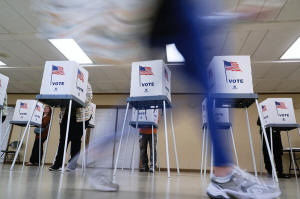Young adults are less likely to follow politics or say voting is
important: AP-NORC poll
[August 06, 2025]
By NICHOLAS RICCARDI, LINLEY SANDERS and AMELIA THOMSON-DEVEAUX
WASHINGTON (AP) — Mairekk Griffiths, a 26-year-old cook in a Denver
suburb, doesn’t think he’ll ever pay a lot of attention to U.S. politics
unless radical change happens.
“If another party was likely to win, I’d be interested in that,” said
Griffiths, who voted for Democrat Kamala Harris in last year's
presidential race but, like many his age, does not see voting as that
valuable.
“I can’t say either way that voting matters,” Griffiths said. “It’s just
picking the least bad option. That’s what I remember my whole life —
both sides are bad, but this side is less bad.”
Young people such as Griffiths are less engaged with U.S. politics than
older Americans and less likely to say voting is important, according to
a new poll from The Associated Press-NORC Center for Public Affairs
Research. Young people — even those who follow politics closely — are
less likely to say issues such as the economy, government spending and
health care are “extremely important” to them than comparable older
adults.
The findings point to a broad sense of disillusionment among younger
people about the country's political system — even if, like Griffiths,
they still end up casting a ballot. Alberto Medina, who leads the Center
for Information and Research on Civic Engagement at Tufts University,
which studies youth and politics, noted that turnout among young people
hit record levels in the 2020 election and was high last year.
“There’s a sense that democracy isn’t working for young people. There’s
a lack of belief that democracy is even able to improve their lives,”
Medina said. “At the same time, we have been living in an era of high
youth voting.”

Disengagement from political parties and politics
In another sign of their general estrangement from politics, the poll
shows young adults are more likely to reject political party labels.
About one-third of adults under age 30 identify as political
independents who don't lean toward either major political party,
compared with 17% of Americans age 60 or older.
The poll also finds young people are far less likely to follow politics
closely than older adults are.
Only about 2 in 10 of adults under age 30 say they follow U.S. politics
“extremely” or “very" closely, compared with about one-third of
Americans overall. That's even higher among adults age 60 or older — 45%
of this group says they follow U.S. politics at least very closely.
Disengagement is higher among teenagers, with an AP-NORC poll from May
finding 44% of teens ages 13 to 17 report following U.S. politics “not
very closely” or “not closely at all.”
Meanwhile, about two-thirds of adults under age 30 say it’s “extremely”
or “very” important to vote, compared with almost 9 in 10 over age 45
who say it’s at least “very” important to vote.
Some of these habits could shift as people grow older. Younger people
traditionally are less likely to vote than older people, and voter
participation tends to go up with age. It's possible that engagement
with politics could follow a similar pattern.
Brittany Diaz, 28, follows politics closely for an unusual reason: Her
oldest son, who is 7, is obsessed with the news and watches it every
night. Diaz, a Republican who lives in an Albuquerque, New Mexico,
suburb, acknowledges that she’s unusual among her age group because she
decided to start paying attention to politics when she had her first
child at 20.
[to top of second column]
|

People vote Nov. 5, 2024, in Oak Creek, Wis. (AP Photo/Morry Gash,
File)

“Now that I have kids, I’m like, ‘I need to care,’” she said.
In closely following politics, Diaz is different from many other
women under 30.
Women in her age group are less likely than young men to say they
follow U.S. politics, the poll finds. About one-quarter of men under
30 say they follow politics “extremely” or “very” closely, compared
with 16% of women in the same age group. And about 4 in 10 young
women say they follow U.S. politics “not very closely” or “not
closely at all” compared with about a quarter of young men.
Lower investment in key issues
On a few issues, such as the economy and health care, the divide
between the youngest and oldest Americans isn’t large. About 8 in 10
Americans under age 30 say the economy is “extremely” or “very”
important to them personally, compared with about 9 in 10 Americans
age 60 or older.
But older adults are much likelier to say topics that have taken
center stage during the first six months of President Donald Trump's
second term — including immigration and government spending — are
“extremely” or “very” important to them personally compared with
Americans under 30.
That's even true for topics such as the situation in the Middle
East, which has become a rallying cry for young activists since the
Israel-Hamas war broke out. Only about 4 in 10 adults under 30 say
this is highly important to them personally, compared with about 6
in 10 Americans age 60 or older.
For some, that lack of interest could be related to a sense that the
political system doesn't respond to their needs.
At 18, Blake Marlar is just starting to pay attention to politics.
As Trump’s tax cut and spending bill moved through the
Republican-controlled Congress, the aspiring geology major at the
University of Nebraska emailed his state’s two senators, both
Republicans, objecting to its Medicaid cuts and increases in
immigration enforcement funding.
“They didn’t seem to take me seriously,” Marlar said. “While I
recognize they have to represent the whole state and the whole state
doesn’t agree with me, it could have been a different experience.”

But he's resolved not to give up on politics: “In the future," he
said, "I’ll do my part and vote.”
___
Riccardi reported from Denver.
___
The AP-NORC poll of 1,437 adults was conducted July 10-14, using a
sample drawn from NORC’s probability-based AmeriSpeak Panel, which
is designed to be representative of the U.S. population. The margin
of sampling error for adults overall is plus or minus 3.6 percentage
points.
All contents © copyright 2025 Associated Press. All rights reserved |